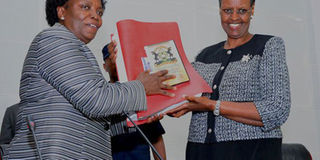Stop the talk and invest in education

Investment in science rooms is necessary at primary level because it is important that students are exposed to practical science lessons at an early age. FILE PHOTO
What you need to know:
- The issue: Education.
- Our view: Government needs to get its priorities right if we are to invest and make our schools and students perform better.
On Thursday afternoon the minister for Education and Sports, Ms Janet Museveni, blamed the poor results posted in the 2018 Uganda Certificate of Education (UCE) examinations on poor teaching methods and lack of practical skills.
Responding to a revelation by the Executive Secretary of the Uganda National Examinations Board (Uneb), Mr Daniel Odongo, that the highest number of examination malpractices had been registered in Physics, Chemistry, Biology and Mathematics, Ms Museveni who was presiding over the release of the results pointed out that so many “candidates are not exposed to practical experience” and so end up bungling up when faced with practical examinations.
Ms Museveni is right, but talk, as they say, is cheap. What the country needs, and one which is not cheap, are practical solutions to the problem. The solution here is for government to invest in education by constructing science rooms in the Universal Primary Education (UPE) schools and laboratories in the Universal Secondary Education (USE) schools.
Investment in science rooms is necessary at primary level because it is important that students are exposed to practical science lessons at an early age. The foundation would service them well when they get to the secondary education levels.
However, government needs to get its priorities right if we are to invest and make our schools and students perform better. It is difficult at this point in time to say that government has its priorities right. Why? In 2007 government made Physics, Chemistry and Biology compulsory, but it had not put the necessary infrastructure in place.
In its manifesto for the period between 2011 and 2016 the NRM promised to construct and equip 475 laboratories for purposes of enhancing the teaching of sciences, but by its own admission in the 2016 to 2021 manifesto, only 254 laboratories were rehabilitated.
At the same time funding to the education sector has been reducing by the year. In the financial year 2008/2009 education took about 20 per cent of the National Budget, but that dropped to 18 per cent in the financial year 2013/14. This financial year it is down to 11 per cent! This partially explains why performance in certain directorates of the ministry has been grossly affected.
So Ms Museveni’s talk must be followed with action. As the political head, Ms Museveni must put her foot down and push the ministry of Finance to avail the Education with more funds to facilitate improvements in the sector.
Our commitment to you
We pledge:
• To be accurate and fair in all we do.
• To be respectful to all in our pursuit of the truth.
• To refuse to accept any compensation beyond that provided by Monitor Publications Ltd. for what we do in our news gathering and decision-making.
Further, we ask that we be informed whenever you feel that we have fallen short in our attempt to keep these commitments.




